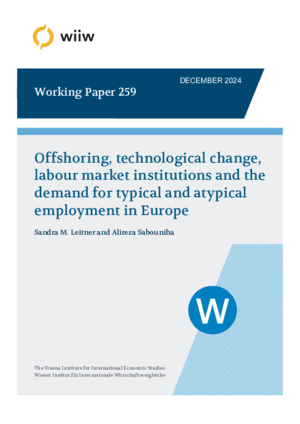Offshoring, technological change, labour market institutions and the demand for typical and atypical employment in Europe
Sandra M. Leitner and Alireza Sabouniha
wiiw Working Paper No. 259, December 2024
59 pages including 24 Tables and 4 Figures
This paper analyses the effect on employment of two megatrends: offshoring (the international outsourcing of production stages) and technological change, in general and by type of employment in terms of typical and atypical employment in a group of ‘old’ and ‘new’ EU member states between 2009 and 2018, and also examines the moderating role of labour market institutions and regulation in the EU, specifically employment protection legislation (EPL). The results show that offshoring had a negative effect on employment in the manufacturing sector, but a positive effect on employment in the service sector. The former was due to a reduction in typical employment and the latter to an increase in atypical employment, making offshoring an important driver of the expansion of atypical employment in the service sector. Information and communications technology, especially communications technology, has increased total employment, mainly through an increase in the demand for atypical employment, for which it is another important driver. Robotisation had a labour displacement effect, mainly at the expense of typical employment, which was more pronounced in the ‘old’ EU member states than in the less automated ‘new’ EU member states. EPL played an important mediating role: it dampened employment adjustments due to offshoring of the more protected type of employment and encouraged stronger adjustments of the less protected type of employment. Conversely, strict EPL acted as an amplifier of the negative effect of robotisation on employment.
Keywords: Offshoring, robotisation, information and communications technology, labour demand, typical and atypical employment
JEL classification: F16, F22, F66
Countries covered: Austria, Belgium, Czechia, France, Poland, Slovakia, Spain, Switzerland
Research Areas: Labour, Migration and Income Distribution
